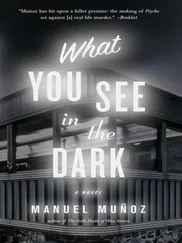Ted Chiang - Liking What You See - A Documentary
Здесь есть возможность читать онлайн «Ted Chiang - Liking What You See - A Documentary» весь текст электронной книги совершенно бесплатно (целиком полную версию без сокращений). В некоторых случаях можно слушать аудио, скачать через торрент в формате fb2 и присутствует краткое содержание. Жанр: Фантастика и фэнтези, на английском языке. Описание произведения, (предисловие) а так же отзывы посетителей доступны на портале библиотеки ЛибКат.
- Название:Liking What You See: A Documentary
- Автор:
- Жанр:
- Год:неизвестен
- ISBN:нет данных
- Рейтинг книги:4 / 5. Голосов: 1
-
Избранное:Добавить в избранное
- Отзывы:
-
Ваша оценка:
- 80
- 1
- 2
- 3
- 4
- 5
Liking What You See: A Documentary: краткое содержание, описание и аннотация
Предлагаем к чтению аннотацию, описание, краткое содержание или предисловие (зависит от того, что написал сам автор книги «Liking What You See: A Documentary»). Если вы не нашли необходимую информацию о книге — напишите в комментариях, мы постараемся отыскать её.
Liking What You See: A Documentary — читать онлайн бесплатно полную книгу (весь текст) целиком
Ниже представлен текст книги, разбитый по страницам. Система сохранения места последней прочитанной страницы, позволяет с удобством читать онлайн бесплатно книгу «Liking What You See: A Documentary», без необходимости каждый раз заново искать на чём Вы остановились. Поставьте закладку, и сможете в любой момент перейти на страницу, на которой закончили чтение.
Интервал:
Закладка:
Tamera Lyons:
I thought that commercial was totally idiotic. It’s not like I’m in favor of the initiative—I don’t want people to vote for it—but people shouldn’t vote against it for the wrong reason. Growing up with calli isn’t crippling. There’s no reason for anyone to feel sorry for me or anything. I’m dealing with it fine. And that’s why I think people ought to vote against the initiative:because seeing beauty is fine.
Anyway, I talked to Garrett again. He said he’d just gotten his calli turned off. He said it seemed cool so far, although it was kind of weird, and I told him I felt the same way when I got mine disabled. I suppose it’s kind of funny, how I was acting like an old pro, even though I’ve only had mine off for a few weeks.
Joseph Weingartner:
One of the first questions researchers asked about calliagnosia was whether it has any “spillover,” that is, whether it affects your appreciation of beauty outside of faces. For the most part, the answer seems to be “no.” Calliagnosics seem to enjoy looking at the same things other people do. That said, we can’t rule out the possibility of side effects.
As an example, consider the spillover that’s observed in prosopagnosics. One prosopagnosic who was a dairy farmer found he could no longer recognize his cows individually. Another found it harder to distinguish models of cars, if you can imagine that. These cases suggest that we sometimes use our face-recognition module for tasks other than strict face recognition. We may not think something looks like a face—a car, for example—but at a neurological level we’re treating it as if it were a face.
There may be a similar spillover among calliagnosics, but since calliagnosia is subtler than prosopagnosia, any spillover is harder to measure. The role of fashion in cars’ appearances, for example, is vastly greater than its role in faces’, and there’s little consensus about which cars are most attractive. There may be a calliagnosic out there who doesn’t enjoy looking at certain models as much as he otherwise would, but he hasn’t come forward to complain.
Then there’s the role our beauty-recognition module plays in our aesthetic reaction to symmetry. We appreciate symmetry in a wide range of settings—painting, sculpture, graphic design—but at the same time we also appreciate asymmetry. There are a lot of factors that contribute to our reaction to art, and not much consensus about when a particular example is successful.
It might be interesting to see if calliagnosia communities produce fewer truly talented visual artists, but given how few such individuals arise in the general population, it’s difficult to do a statistically meaningful study. The only thing we know for certain is that calliagnosics report a more muted response to some portraits, but that’s not a side effectper se ; portrait paintings derive at least some of their impact from the facial appearance of the subject.
Of course, any effect is too much for some people. This is the reason given by some parents for not wanting calliagnosia for their children: they want their children to be able to appreciate the Mona Lisa, and perhaps create its successor.
Marc Esposito, fourth-year student at Waterston College:
That Pembleton thing sounds totally crazed. I could see doing it like a setup for some prank. You know, as in, you’d fix this guy up with a girl, and tell him she’s an absolute babe, but actually you’ve fixed him up with a dog, and he can’t tell so he believes you. That’d be kind of funny, actually.
But I sure as hell would never get this calli thing. I want to date good-looking girls. Why would I want something that’d make me lower my standards? Okay, sure, some nights all the babes have been taken, and you have to choose from the leftovers. But that’s why there’s beer, right? Doesn’t mean I want to wear beer goggles all the time.
Tamera Lyons:
So Garrett and I were talking on the phone again last night, and I asked him if he wanted to switch to video so we could see each other. And he said okay, so we did.
I was casual about it, but I had actually spent a lot of time getting ready. Ina’s teaching me to put on makeup, but I’m not very good at it yet, so I got that phone software that makes it look like you’re wearing makeup. I set it for just a little bit, and I think it made a real difference in how I looked. Maybe it was overkill, I don’t know how much Garrett could tell, but I just wanted to be sure I looked as good as possible.
As soon as we switched to video, I could see him react. It was like his eyes got wider. He was like, “You look really great,” and I was like, “Thanks.” Then he got shy, and made some joke about the way he looked, but I told him I liked the way he looked.
We talked for a while on video, and all the time I was really conscious of him looking at me. That felt good. I got a feeling that he was thinking he might want us to get back together again, but maybe I was just imagining it.
Maybe next time we talk I’ll suggest he could come visit me for a weekend, or I could go visit him at Northrop. That’d be really cool. Though I’d have to be sure I could do my own makeup before that.
I know there’s no guarantee that he’ll want to get back together. Getting my calli turned off didn’t make me love him less, so maybe it won’t make him love me any more. I’m hoping, though.
Cathy Minami, third-year student:
Anyone who says the calli movement is good for women is spreading the propaganda of all oppressors: the claim that subjugation is actually protection. Calli supporters want to demonize those women who possess beauty. Beauty can provide just as much pleasure for those who have it as for those who perceive it, but the calli movement makes women feel guilty about taking pleasure in their appearance. It’s yet another patriarchal strategy for suppressing female sexuality, and once again, too many women have bought into it.
Ofcourse beauty has been used as a tool of oppression, but eliminating beauty is not the answer; you can’t liberate people by narrowing the scope of their experiences. That’s positively Orwellian. What’s needed is a woman-centered concept of beauty, one that lets all women feel good about themselves instead of making most of them feel bad.
Lawrence Sutton, fourth-year student:
I totally knew what Walter Lambert was talking about in his speech. I wouldn’t have phrased it the way he did, but I’ve felt the same way for a while now. I got calli a couple years ago, long before this initiative came up, because I wanted to be able to concentrate on more important things.
I don’t mean I only think about schoolwork; I’ve got a girlfriend, and we have a good relationship. That hasn’t changed. What’s changed is how I interact with advertising. Before, every time I used to walk past a magazine stand or see a commercial, I could feel my attention being drawn a little bit. It was like they were trying to arouse me against my will. I don’t necessarily mean a sexual kind of arousal, but they were trying to appeal to me on a visceral level. And I would automatically resist, and go back to whatever I was doing before. But it was a distraction, and resisting those distractions took energy that I could have been using elsewhere.
But now with calli, I don’t feel that pull. Calli freed me from that distraction, it gave me that energy back. So I’m totally in favor of it.
Lori Harber, third-year student at Maxwell College:
Calli is for wusses. My attitude is, fight back. Go radical ugly. That’s what the beautiful people need to see.
I got my nose taken off about this time last year. It’s a bigger deal than it sounds, surgery-wise; to be healthy and stuff, you have to move some of the hairs further in to catch dust. And the bone you see (taps it with a fingernail) isn’t real, it’s ceramic. Having your real bone exposed is a big infection risk.
Читать дальшеИнтервал:
Закладка:
Похожие книги на «Liking What You See: A Documentary»
Представляем Вашему вниманию похожие книги на «Liking What You See: A Documentary» списком для выбора. Мы отобрали схожую по названию и смыслу литературу в надежде предоставить читателям больше вариантов отыскать новые, интересные, ещё непрочитанные произведения.
Обсуждение, отзывы о книге «Liking What You See: A Documentary» и просто собственные мнения читателей. Оставьте ваши комментарии, напишите, что Вы думаете о произведении, его смысле или главных героях. Укажите что конкретно понравилось, а что нет, и почему Вы так считаете.











